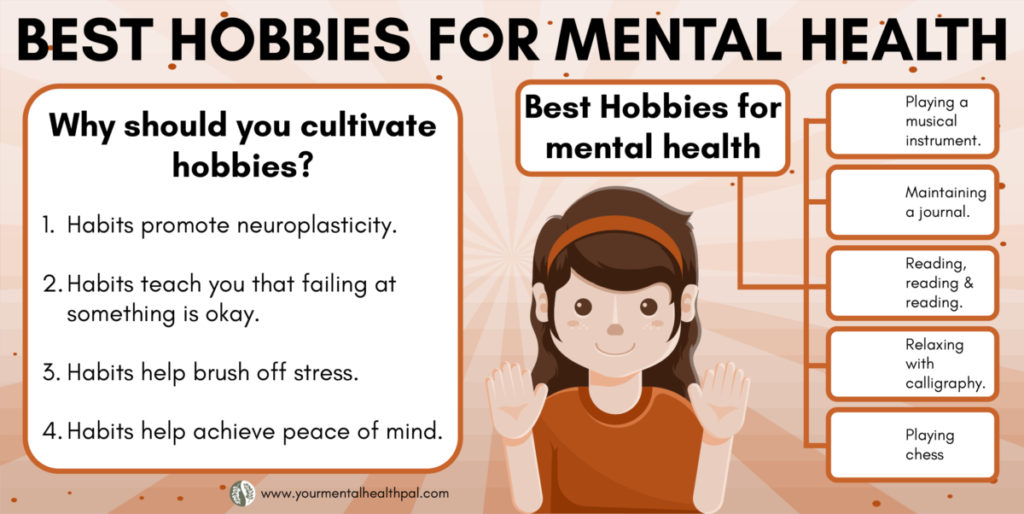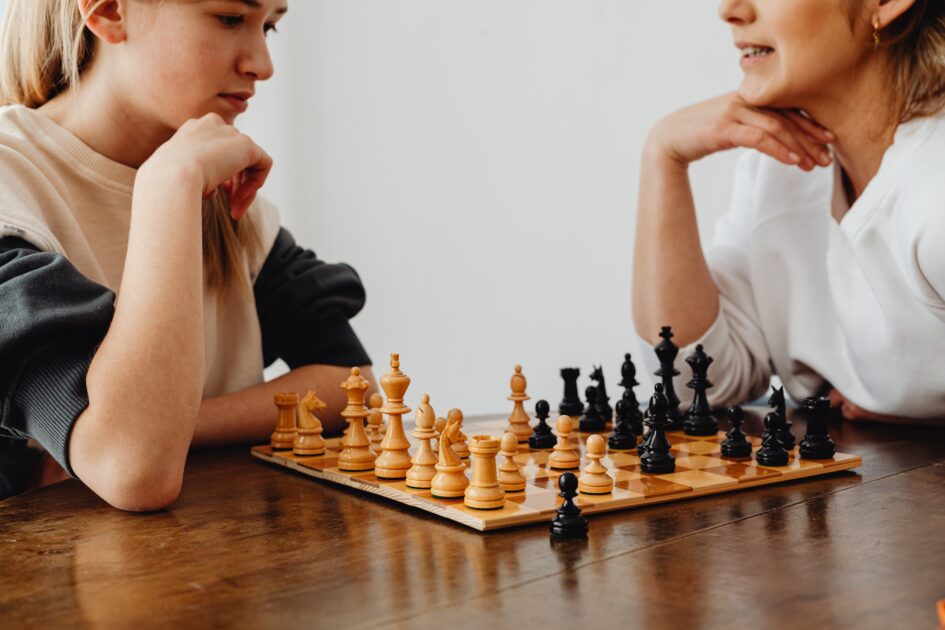
Do you remember the feeling of peddling in the park with friends or doodling on notepads? What about the incomparable joy of maintaining a journal every day? Perhaps you spent hours cutting your favorite cartoon characters from the magazine or practicing dance moves to perfection.
These nostalgic memories from our hobby-filled childhoods make us wonder where did those hobbies go when we grew up. Why did we stop taking time out for things that excited us?
Yes, you are constantly busy – we get it. The last few years have been stressful, and it’s okay if developing a hobby wasn’t your top priority. In the fast-paced world of deadlines and packed schedules, who has the time to read and practice the best hobbies for mental health.
Juggling between work, academics, and personal relationships might leave you little to no time for your mental health. Eventually, you might end up feeling overwhelmed and burdened with your schedule.
But our bodies weren’t meant to be continuously put in these stressful situations.
To put it more clearly, you can’t work all the time and then not feel its adverse effects later. The remedy? Create a rhythm for work and rest.
The overachiever self inside us won’t agree. The pressure put on us by the hustle culture makes us feel guilty for doing anything that does not take us closer to our goals. The idea of being ‘always on’ or of always doing something for gain has made us drop the most cherished of hobbies.
It has never been more important to ensure we look after our mental health as much as our physical health.
And that is precisely why you need to add fun and recreational hobbies to your daily routine.
Give something new – like pottery or journaling – a chance. Sketch some scenes or compose a new poem. Try learning a new instrument or join a biking group. Why? Because all these hobbies have brain-boosting superpowers.
Let’s dive deeper into the hobby and mental health connection.
But first, let’s clear the air. What exactly is a ‘hobby’?

The Merriam-Webster dictionary defines ‘hobby’ as an activity outside one’s regular work that is engaged in to find relaxation. A hobby can be termed as the insection between action and interest. For instance, if you are interested in food, try different recipes. And voila, a hobby is born.
Hobbies bring balance to your life. Try to think of the things that bring you joy and pleasure; knitting, photography, gardening, etc. You might pursue a different full-time profession, but hobbies, in some sense, pursue you.
Why are hobbies good for mental health?
Research shows that taking up and practicing a hobby is good for health. Research has suggested that hobbies are associated with several health benefits. Some of them are:
- low blood pressure,
- low body mass index,
- low stress-inducing hormones, etc.
As per a study conducted in 2020, hobbies were found to reduce symptoms of depression. They even reduce the probability of experiencing depression by a large 30%.
So, if you don’t take up hobbies for mental health, you overlook a wealth of health benefits. Here are the benefits of hobbies for your mental health:
1. Habits promote neuroplasticity.
The concept of neuroplasticity is over 100 years old. It states that you have the power to alter the structures in your brain through the habits you build and the choices you make.
So when you start developing a new habit, you create new neural pathways. The human brain is an extensive network. While taking up new hobbies, you are adding new links and reference points. It helps you respond to things differently. Apart from this, it also allows the brain to discard unhelpful habits.
2. Habits bolster self-esteem
The more you regularly focus on an activity, the better you tend to get. And that’s why hobbies help build self-confidence and bolster self-esteem. According to a study, women pursuing the hobbies of their interest were more shielded against self-objectification.
3. Habits teach you that failing is okay
You have all heard it before, but it needs repetition. Learning to accept failures is good for you. A new hobby has fewer stakes associated with it. Hence it gives you the right field to test the waters. Failing at something you are doing for fun might help you overcome the fear of failure.
4. Habits help brush off stress
Are you feeling more stressed nowadays? Well, you have company. In 2018, 55% of Americans complained of stress during the day. This number is the fourth highest in the world.
There is a lot of negative emotion surrounding us. To decompress, try out your favorite hobby. As they say, a habit a day keeps stress at bay. That’s exactly what science thinks as well. Science says that when you engage in an activity that interests you, you are likely to have a:
- good mood,
- stable heartbeat, and
- less stress.
5. Habits prompt ‘flow’
Some hobbies are linked to inducing a mindful state called ‘flow.’ Flow can be defined as the state of energized focus. It is the point where you are fully involved in an activity.
Getting into flow has an array of benefits, such as
Hobbies to cultivate for mental health and wellbeing
The choice of your hobbies is your own. The only criterion is that it should make you feel better and happier. However, just like everything else in life, you might have to try different hobbies to find the perfect one.
Read on to find the five best hobbies for mental health and their scientific benefits to make your choices easier.
1. Playing a musical instrument

One of the best mental health hobbies on our list is learning or re-learning to play an instrument.
Did you know that music impacts the brain in unimaginable ways? That’s right! The effects of music on our minds go beyond just mood enhancement.
Learning to create music can lead to an increase in the neuroplasticity of the brain. Studies have observed noticeable structural changes in the brains of people who play some instrument. The most notable difference occurs in the corpus callosum. It is a bunch of fibers that connect both sides of the brain. This area is much more prominent among people who play at least one instrument regularly.
Other than this, the parts that control movement and hearing are found to be bigger among keyboard players. It makes you want to run and get a keyboard, doesn’t it?
2. Maintaining a journal

Maintaining a journal regularly is more than just documenting your days. It is an effective stress release channel. When you pen down your thoughts, you get more clarity and perspective.
Journaling helps with anxiety and depression. People having anxiety often have to deal with excessive worry and anxious thoughts. Writing down these thoughts in the journal allows finding answers to them.
A study conducted by HHS Public Access in 2013 revealed that people journaling their thoughts were found to have fewer symptoms of depression than those who weren’t.
3. Reading, Reading, & Reading

We cannot emphasize the importance of reading books. Books are not just a form of recreation. They have valuable lessons hidden within their words. You could join a book club or read alone. But make sure you are reading a few pages daily.
Reading strengthens the neural connections in the brain. Reading helps alleviate the symptoms of depression. Research has shown that reading about characters in fiction novels enhances emotional understanding among people. Now you know why crying buckets at the death of your favorite character from the book is not entirely a waste.
4. Relaxing with Calligraphy

When people think of calligraphy, they associate it with a form of fancy writing. However, the art of calligraphy goes deeper than that.
It has been associated with a variety of mental health benefits. People across the world have used calligraphy as a practice of meditation. The calming and soothing effects of calligraphy are induced by the concentration the activity needs.
If the goal is to attain mindfulness, you now know where to start!
5. Playing Chess

Chess is widely misunderstood as the game of some gifted people. This has created an image that only geniuses will know how to play the game well. In reality, chess is one of the best hobbies to develop for mental health.
Chess enhances brain functioning. When the brain does not have stimulation, brain cells begin to die. This is a classic example of the motto “if you don’t use it, lose it”.
In patients with ADHD, chess helps improve concentration. It enhances cognitive abilities. The game is also associated with enhanced memory. If you want to build a good memory, maybe try chess.
Conclusion:
Hobbies are meant to get you relaxed. They shouldn’t become another checkbox on your chores list. Instead, they should be something you intentionally and happily choose to invest your time with.
We live in the era of bleeding work hours and a digital world trying to steal our attention. Therefore, taking charge of the 1440 minutes you have in a day is important. If that sounds too daunting, just take control of at least 20% of this. According to Dorrie Clark, a wellness coach and motivator, 3-4 hours of practicing a hobby are more than enough.
Now that you know the best hobbies for mental health, let’s take you to the book that will help you build them. Read about Atomic Habits, the self-help book the world needs right now, here.
To build an aware society and learn more about mental health, subscribe to Your Mental Health Pal.


Your blogs will help many to overcome mental health issues. Good keep it up.😊
Hobbies are really important. I love cooking, might try out drawing. Great article!